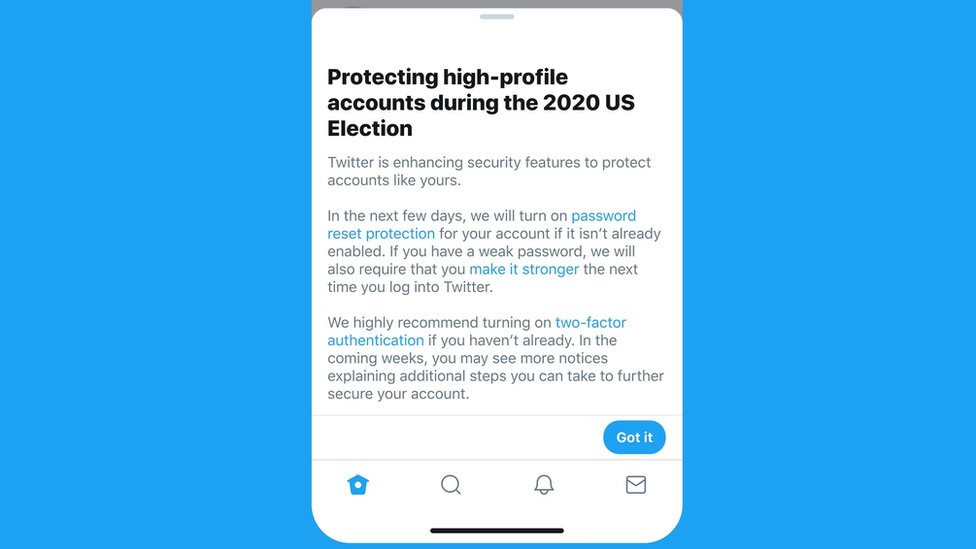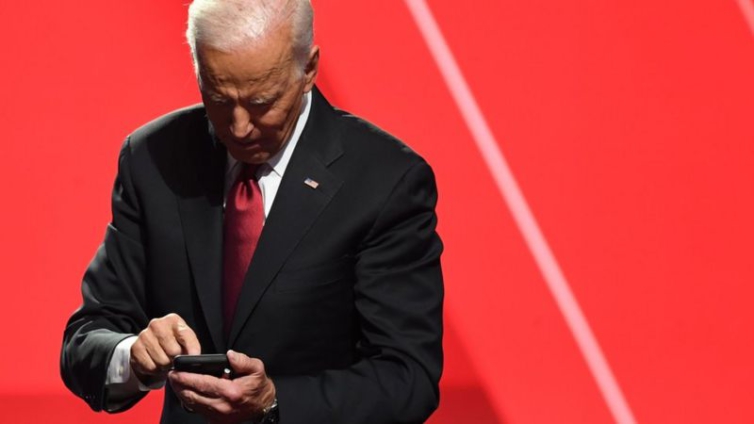Twitter has automatically activated extra account protection for politicians and key figures in the forthcoming US election.
A select group of election-related accounts will have to make immediate changes to improve their security.
Twitter was the victim of one of the most significant hacks of a social network in history, in June.
It said it had learned "from the experience of past security incidents" and was focused on election security.
Twitter said that in the coming weeks, it would be adding "proactive internal security safeguards" for a much wider range of high-profile election-related accounts.
They include:
- The Executive Branch (including the president and vice-president)
- Congress (The House of Representatives and the Senate)
- US governors and secretaries of state
- Presidential campaigns, political parties and candidates
- Significant news outlets and political journalists
Starting this week, those accounts will start receiving in-app notifications of immediate changes on the user's side.
Under the new rules, they will need to use a strong password - those that do not meet Twitter's standards will be required to change it the next time they log in.
All the accounts have had password reset protection enabled by default - a safety measure that requires the account holder to confirm the email address and password on file if they want to reset their password.
And they will also be encouraged - but not required - to enable two-factor authentication.
Hack history
The June hack saw some of the world's most notable celebrities - such as Bill Gates, Joe Biden and Kanye West - have their accounts seized by the attacker to tweet an apparently simple Bitcoin scam.
But one of Twitter's most-followed accounts - US President Donald Trump - was unaffected. It later emerged that this was because the president's account had extra security protections in place internally.

The change comes at a time when Twitter is locked in a battle against electoral misinformation on the platform - one that has put it at odds with President Trump.
The social network has labelled some of the president's tweets as misleading - particularly his unsubstantiated claims around postal voting fraud.
It had previously tagged some of the tweets for breaching policies on glorifying violence and abusive behaviour.
But the wider concern about the role of the social media companies in the election stems from the 2016 presidential campaign, which saw President Trump win his first term in office.
In the wake of the election, the US Senate and others said that Russian operatives had tried to leverage all major social media outlets to influence the outcome.
Latest Stories
-
ORAL: We won’t witch-hunt, we’ll focus on transparency, not revenge – Ablakwa
50 seconds -
Bawumia joins thousands in Kumasi for burial prayers for Ashanti Regional Imam
3 hours -
Blue Gold Bogoso Prestea Limited challenges government actions in court
3 hours -
Verdicts due for 51 men in Pelicot mass rape trial that shook France
3 hours -
Syria not a threat to world, rebel leader Ahmed al-Sharaa tells BBC
4 hours -
Patrick Atangana Fouda: ‘A hero of the fight against HIV leaves us’
4 hours -
Trinity Oil MD Gabriel Kumi elected Board Chairman of Chamber of Oil Marketing Companies
5 hours -
ORAL campaign key to NDC’s election victory – North America Dema Naa
5 hours -
US Supreme Court to hear TikTok challenge to potential ban
5 hours -
Amazon faces US strike threat ahead of Christmas
5 hours -
Jaguar Land Rover electric car whistleblower sacked
6 hours -
US makes third interest rate cut despite inflation risk
6 hours -
Fish processors call for intervention against illegal trawling activities
6 hours -
Ghana will take time to recover – Akorfa Edjeani
6 hours -
Boakye Agyarko urges reforms to revitalise NPP after election defeat
7 hours

